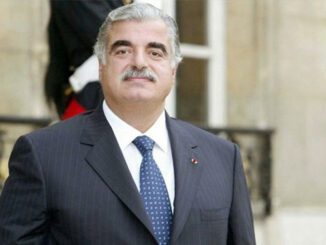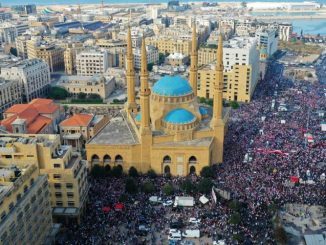
Lebanon’s former prime minister Saad al-Hariri said on Thursday he would back Michel Aoun, a Hezbollah ally, to be president, a move that faces significant opposition but could help resolve the political crisis.
Thursday’s endorsement paves the way for the 81-year old Maronite Christian leader to fill the post that has been vacant since May 2014.
“I announce today before you, my decision to endorse the candidacy of general Michel Aoun for the presidency of the republic,” Hariri said.
He described his decision as necessary to “protect Lebanon, protect the [political] system, protect the state and protect the Lebanese people”.
Hariri said the endorsement came after he had exhausted all other options and was intended “to preserve the political system, reinforce the state, relaunch the economy, and distance us from the Syrian crisis”.
“We want to protect our country from this crisis,” he added.
For two years and five months, the Lebanese parliament has been unable to agree on a successor to former president Michel Sleiman.
Lebanon’s 128-member parliament is now expected to convene next week for a session to vote on the president – the 46th such session since Sleiman’s term expired in May 2014.
Aoun for the presidency
Lebanon’s president is reserved for a Christian candidate under a power-sharing agreement.
The endorsement comes as a surprise with speculation it is the result of a deal that will allow Hariri to return as prime minister.
Aoun said at a televised news conference that the agreement represented an attempt to heal national divisions and “restore political unity”.
Hezbollah, Lebanon’s most powerful political player, released a statement welcoming moves to fill the presidency but without committing to any wider power sharing agreement.
Aoun is allied with the Shia movement Hezbollah, which is backed by Iran and has dispatched fighters to neighbouring Syria to bolster the regime of President Bashar al-Assad.
He served as head of the armed forces and briefly as prime minister during Lebanon’s 1975-1990 civil war, when he was a staunch opponent of Syrian military presence in Lebanon.
Aoun led one of two rival governments during Lebanon’s 1975-90 civil war before the Syrian army forced him into exile. His main Christian rival for the presidency, Samir Geagea, endorsed him earlier this year.
But he shocked many by brokering an alliance with Damascus ally Hezbollah in 2006, a year after his return from exile in France and after Syria pulled its troops from Lebanon.



